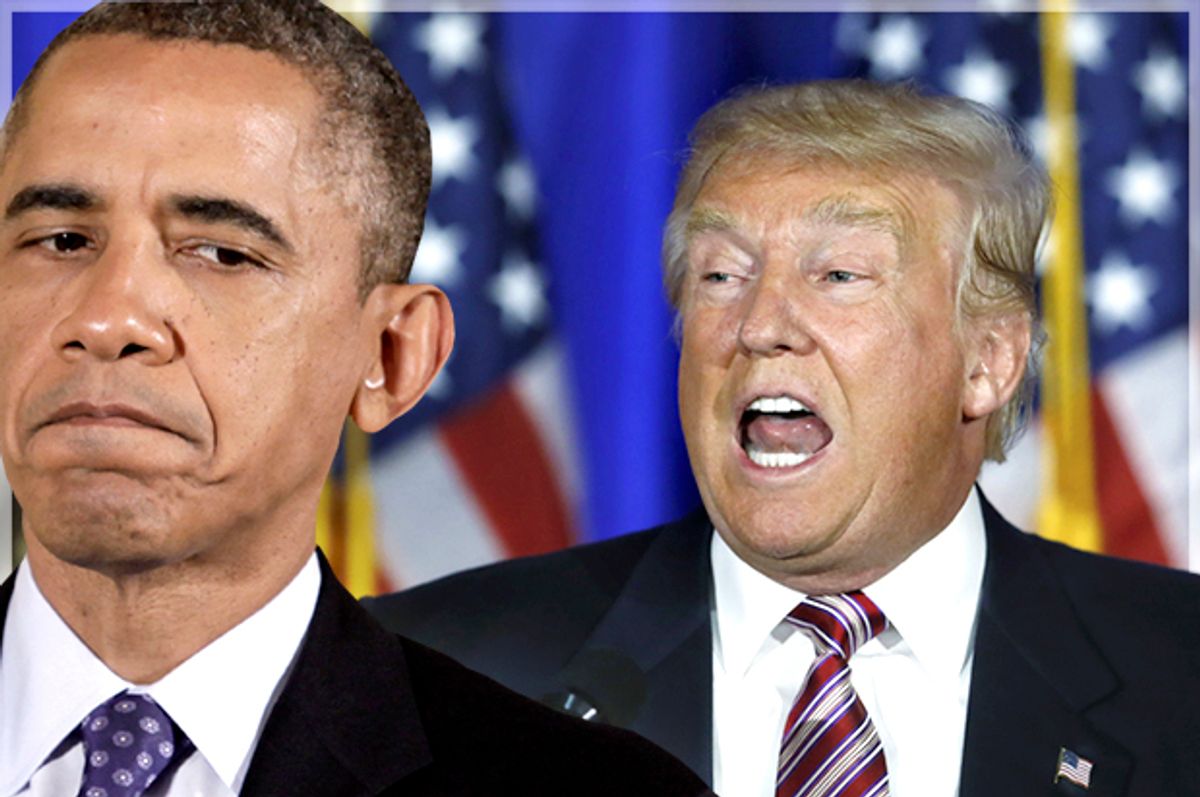The horror of the attack on a gay nightclub in Orlando, now officially the worst mass-shooting event in American history, is still raw and eludes full comprehension. All we have are dribs and drabs of information – the name of the assailant, an incomplete accounting of the victims, and fragments of evidence pointing towards a possible motive. It’s the responsibility of elected officials to deal with this information vacuum, either by filling in the gaps or providing a reassuring public presence during a time of uncertainty and panic.
To our lasting misfortune, one of the public officials whose words we must consider in the aftermath of this historic act of violence is Donald Trump. His initial reaction was, predictably, to boast of his own toughness and alleged foresight. But Trump veered off in an entirely new direction when he stopped by “Fox & Friends” this morning to cryptically insinuate that President Obama is somehow in league with the Islamic State, which is claiming responsibility for the Orlando attack. “We’re led by a man that is either not tough, not smart, or he’s got something else in mind. And the something else in mind, you know, people can’t believe it. People cannot believe – they cannot believe that president Obama is acting the way he acts and can’t even mention the words ‘radical Islamic terrorism.’ There’s something going on. It’s inconceivable.”
As one would expect, Trump’s comments are being met with waves of revulsion and demands that Republicans distance themselves from this rhetoric, which allegedly touches a new low for political rhetoric.
That’s a perfectly reasonable response, but here’s the important thing to remember: this is not new. Trump has not spelunked to a previously undiscovered depth of political discourse. He’s simply taking the words that other high-ranking Republican officials have said and projecting them to a larger audience.
The entirety of the first black president’s time in the national spotlight has been marked by persistent attacks on his American-ness and his loyalty to the country. In February 2015, Rudy Giualini gave a speech at a Republican event in which he state bluntly: “I do not believe, and I know this is a horrible thing to say, but I do not believe that the president loves America.” At the time, political scientist Brendan Nyhan noted that those remarks (which Giuliani later explained were motivated in part by Obama’s unwillingness to “stand up and say there’s a part of Islam that’s sick”) were anything but unusual in the Republican Party:
Suggestions of disloyalty continued after Mr. Obama entered the White House. As conservative pundits continued making hyperbolic accusations, top Republican officials began to chime in more aggressively with similar rhetoric. The president was accused, among other things, of “undermining this country’s national defense on purpose” (Representative John Fleming of Louisiana) and “sympathizing with attackers” of the American embassy in Egypt (the Republican National Committee chairman Reince Priebus). Others raised loaded questions about Mr. Obama’s allegiances, saying, “I just don’t know whose side he’s on” (Senator James Inhofe of Oklahoma), or “I can’t tell,” when asked if Mr. Obama “actually switched sides in the war on terror” (former Secretary of Defense Donald Rumsfeld).
The last previous Republican presidential nominee also went down this road. In the immediate aftermath of the Benghazi terrorist attacks in 2012, Mitt Romney’s campaign released a statement attacking President Obama and the White House for “sympathize[ing] with those who waged the attacks.”
Trump’s comments aren’t unusual for this election cycle either. Marco Rubio, when he was trying to wrest the Republican presidential nomination away from Trump, said “all this damage that [Obama’s] done to America is deliberate” and that the president had “deliberately weakened America.” A Rubio spokesman told CNN that the Florida senator “absolutely” believes that Obama is “intentionally trying to destroy the country.” Trump’s chief rival for the nomination, Ted Cruz, also voiced similar themes. “I recognize that Barack Obama does not wish to defend this country,” Cruz said in an interview following the Paris terrorist attacks last November. “He may have been tired of war, but our enemies are not tired of killing us.” He also called Obama “an apologist for radical Islamic terrorists.”
Trump’s innovation here is to refresh these tired old tropes with his proprietary brand of high-wattage conspiracism. People recoil from it, and they’re correct to do so, but all he’s doing is giving a fuller public airing to a sentiment – Barack Obama as a terrorist-coddling anti-American saboteur – that has formed the spine of much of the Republican and conservative national security rhetoric over the past eight years. Trump is a symptom of a corruption that’s been festering for a long time.

Shares